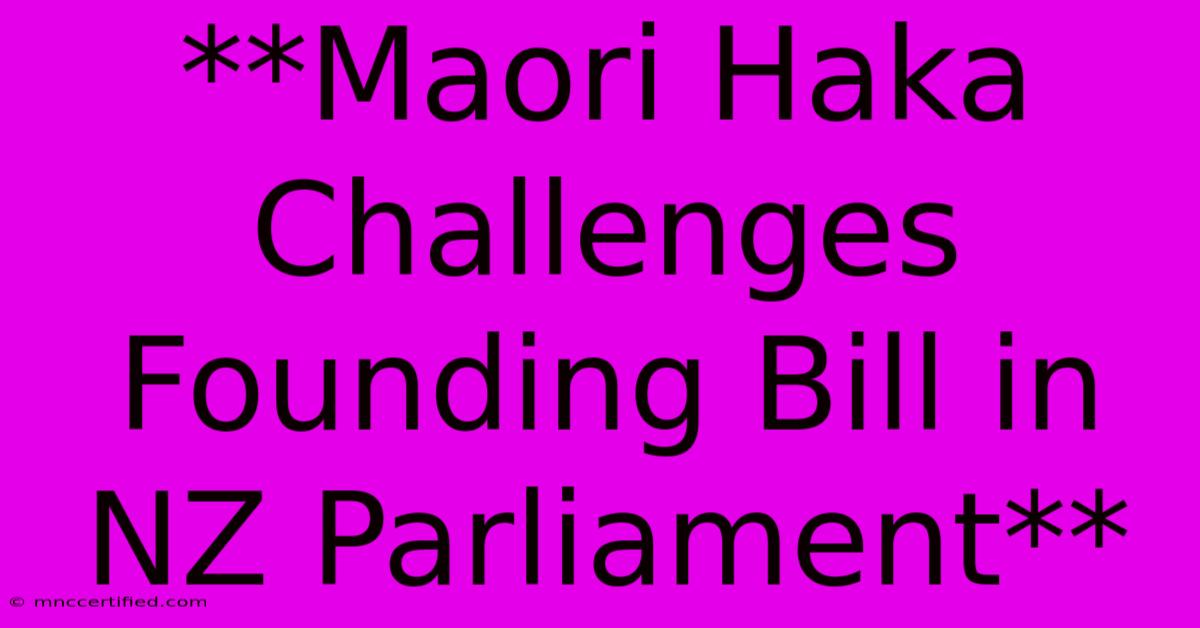**Maori Haka Challenges Founding Bill In NZ Parliament**

Table of Contents
Maori Haka Challenges Founding Bill in NZ Parliament: A Cultural Clash or a Step Towards Reconciliation?
The hallowed halls of the New Zealand Parliament recently witnessed a powerful display of cultural assertion as a group of Māori protesters performed a traditional haka, challenging the very foundations of the nation's founding bill. This event, a stark and symbolic confrontation, has sparked heated debate and raised crucial questions about the future of Māori rights and the ongoing process of reconciliation.
The Haka and its Significance
The haka, a powerful war dance traditionally used by Māori warriors before battle, is much more than a simple display of physical prowess. It embodies the spirit of a people, their resilience, and their connection to the land. In recent years, the haka has become a powerful symbol of Māori identity and cultural pride, often performed at sporting events and other gatherings.
The Founding Bill and its Implications
The founding bill, drafted in 1840, established New Zealand as a British colony and set the stage for the dispossession and marginalization of Māori people. The bill's legacy continues to resonate today, with many arguing that it represents a historical injustice that needs to be addressed.
The Protest: A Bold Statement
The haka performance, led by a group of Māori activists, was a deliberate act of defiance, aiming to challenge the legitimacy of the founding bill and its ongoing impact on Māori society. By performing the haka in the very heart of the nation's political establishment, the protesters aimed to raise awareness of the ongoing struggle for Māori rights and self-determination.
The Reactions: Division and Debate
The protest has sparked a range of reactions, from support to condemnation. Many Māori have praised the bold action as a necessary step towards achieving justice and recognition. Others, however, have criticized the protest as disruptive and disrespectful. The debate highlights the deep divisions within New Zealand society regarding the legacy of colonialism and the ongoing struggle for reconciliation.
Moving Forward: Finding Common Ground
The challenge posed by the haka performance presents an opportunity for reflection and dialogue. It forces New Zealanders to confront the uncomfortable realities of their history and grapple with the question of how to move forward in a way that honors the rights and aspirations of all its citizens.
Key Takeaways
- The haka performance represents a powerful symbol of Māori cultural assertion and the ongoing struggle for self-determination.
- The founding bill's legacy continues to be a source of contention and a barrier to achieving true reconciliation.
- The protest highlights the need for ongoing dialogue and engagement to bridge the gap between Māori and non-Māori communities.
- Finding solutions that address the historical injustices faced by Māori and ensure their full participation in society will be crucial for a truly equitable and inclusive New Zealand.
This event, though controversial, has sparked an important conversation about the future of New Zealand and the role of Māori in shaping its destiny. It remains to be seen whether this cultural clash will lead to meaningful change or further entrench existing divisions. However, one thing is clear: the haka has served as a powerful reminder of the enduring spirit of Māori resistance and the importance of addressing historical injustices.

Thank you for visiting our website wich cover about **Maori Haka Challenges Founding Bill In NZ Parliament**. We hope the information provided has been useful to you. Feel free to contact us if you have any questions or need further assistance. See you next time and dont miss to bookmark.
Featured Posts
-
Is Aurora Crypto A Good Investment
Nov 15, 2024
-
Wordle 1245 November 15 2024 Hint And Answer
Nov 15, 2024
-
Front Tooth Bonding Keeps Breaking
Nov 15, 2024
-
Cynthia Erivo Explains Wicked Ballroom Scene
Nov 15, 2024
-
Hurts Scores On Brotherly Shove For Eagles
Nov 15, 2024